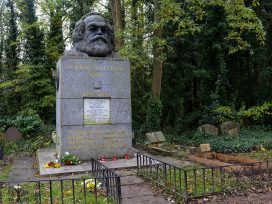The good news for big print media is that demand for quality journalism has never been so high. Yet they need to move with the new technology to continue doing what they do best, writes Knut Olav Åmås, culture editor of the Norwegian daily ‘Aftenposten’.
Articles
Read more than 6000 articles in 35 languages from over 90 cultural journals and associates.
Despite renewed crackdowns on the independent media in Belarus, there are signs that the tide is turning in the battle for free speech in the country. However, victory for the democratic forces will require politicizing Belarus’ young Internet audience, writes Iryna Vidanava.
Neurological and Darwinistic strands in the philosophy of consciousness see human beings as no more than our evolved brains. Avoiding naturalistic explanations of human beings’ fundamental difference from other animals requires openness to more expansive approaches, argues Raymond Tallis.
Why do we so uncritically buy the “democratic rhetoric” of our rulers instead of countering their selfish designs? How was it possible in too many post-communist countries that incredible riches accumulated in the hands of the parasitic few? Why is political power so often fused with wealth? These are only a few of the questions debated by two philosophers in search of an answer to what went wrong in the post-communist world after 1989.
Why is the Orthodox Church of Russia reclaiming the castles and churches of former East Prussia, now the Russian enclave of Kaliningrad, appropriated in 1917? The question is posed by a Lithuanian “outsider” in the light of recent changes in the ownership of important heritage sites in Kaliningrad.
What is the threat implied in the handover of the symbolically significant heritage of the Kaliningrad region to the Orthodox Church of Russia? An examination of the social and cultural aspects of the conflict.
The politics of no alternatives or How power works in Russia
An interview with Gleb Pavlovsky
Gleb Pavlovsky, the Ukrainian-born former dissident turned “political technologist”, abruptly fell out with the Kremlin in April, reportedly over “indiscreet comments” made about the 2012 presidential elections. In interview with Transit a short while before, Pavlovsky gave a revealing inside view of the workings of political power in the former Soviet Union and in post-Soviet Russia.
History has a long fuse and memory often betrays the past. A journey across borders and through no man’s lands brings that past alive and reminds us of what we have lost, in particular the diversity of the past and the beauty of the “other”.
Who created Ratko Mladic?
What remains after a war criminal has been sent to The Hague
When Ratko Mladic faces the International Tribunal in the Hague, he is likely to use the defence of superior orders. But when he asks who it was who voted for Milosevic he has a point, comments Slavenka Drakulic. Will trading off Mladic for the EU allow Serbs to avoid the question of collective responsibility?
When personal integrity is not enough
Herta Müller and Gabriel Liiceanu discuss language and dissidence
Herta Müller has publicly criticized Romanian intellectuals for their passivity during the Ceausescu regime. Talking to the publisher and philosopher Gabriel Liiceanu in Bucharest in October 2010, the novelist and Nobel laureate defended her often unpopular view that the preservation of personal intellectual integrity alone was inadequate as a form of political resistance.

Between past and future
Central European dissent in historical perspective
Lockean liberalism emphasized toleration of religion and other dissenting social practices. Yet in the Marxian critique of liberal freedoms, dissent was seen solely in terms of class struggle: social harmony could be achieved in a classless society, not a pluralist one. According to Barbara Falk, the severance of dissent and toleration has obscured the liberal roots of eastern European dissidence.
The logic of accusation has no end
Adam Michnik and Andrei Plesu discuss "resistance through culture"
For Adam Michnik, resistance to communism took many forms: reproaching another for their lack of heroism is impossible. Talking to Andrei Plesu in Bucharest in February 2011, he called for an end to the logic of accusation and warned against instrumentalizing the quarrel with communism.
Email, text messaging and social networks have revolutionized the way we communicate. Yet as the magic of instantaneity fades, George Blecher begins to miss some good old-fashioned penmanship.
The Eurozine conference on “Changing Media – Media in Change” from 13-16 May 2011 brought fresh insights to debates on the future of journalism, intellectual property and free speech, and made one thing very clear: independent cultural journals are where reflexion and criticality combine with changing media strategies.

The Arab Spring
Religion, revolution and the public sphere
What has emerged in the Arab world is a thoroughly modern mass democratic movement, writes Seyla Benhabib. Speculations that Islamic fundamentalists will hijack the transformation process are motivated by a cultural prejudice that forgets the contentiousness at the historical core of western democracies.
The performance art of the 1960s and ’70s transformed acting into religion, writes Donatien Grau: pain, blood, and semen – they were doing it for real. The younger generation of performance artists are rejecting this heritage: their return to narrative is a way out of the mind-body dualism.